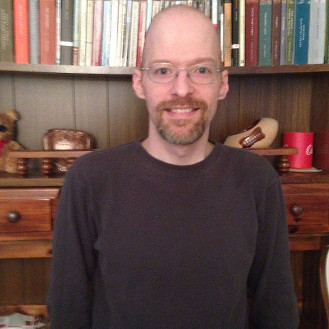Welcome to our Introvert Interviews series, where we talk to introverts from all walks of life about their experiences and their introversion.
 James Dennard is a teacher, spina bifida advocate, and co-host of La Literati, a literary radio show.
James Dennard is a teacher, spina bifida advocate, and co-host of La Literati, a literary radio show.
How did La Literati get started?
My friend and cohost for La Literati, Tosha, came up with the idea to do the podcast. She was already cohosting another podcast called Chit Chat Chicks, where she and another friend of ours, Jane, talk to people who mostly work in the entertainment industry. Tosha and I are both avid readers and writers, and she thought it would be fun to talk to some writer friends. It grew from that.
For the podcast, you recently facilitated a roundtable discussion on introversion. What led you to choose that topic?
I read Susan Cain’s book Quiet and listened to her TED talk shortly after it was published. I suggested that Tosha read the book, which she did and enjoyed it. The more we talked about the ideas surrounding the book, we realized that all of us in the round table group were introverts. So we thought it was a perfect opportunity to devote a podcast episode to the subject.
During that episode you mentioned that having spina bifida helped you develop good people skills. Can you elaborate on that?
I naturally keep to myself most of the time. But I can hold my own in conversations, though I mostly like to listen to the other person. When I was young, family, friends, doctors, teachers, frequently asked me how I was doing (physically, and otherwise). So, even though I would rather have been left alone most of the time, I learned to talk to people about how I was. That, combined with my natural introverted inclination to listen, I think contributed to my development of good people skills.
Do you have a pre-podcast routine?
My pre-podcast routine is really just two things: One is going over the notes for the show (topics we’re going to discuss, background of our guest, that sort of thing). Also, I stay off of social media on podcast days before the interview. Social media can be draining for me sometimes. Even though it isn’t face to face, it’s still social interaction with lots of conversations going back and forth. I need some quiet time before and after the show to even things out.
Are you aware of your introversion while doing the podcast?
I am very aware of my introversion during the podcast. I have nerves before every show. The fact that it’s recorded live, and often our guest is someone I’ve only talked to online, if at all, contributes to my nerves. And because of my personality, I often need time to listen and think about what our guest is talking about to be able to think of follow up questions and help the interview move along more smoothly. I am glad that I don’t do the podcast alone. Truthfully, I would never have had the idea myself to do the podcast. Writing book reviews on my blog is much more comfortable for me.
How much of an effect do you think being an introvert has had on your teaching career?
As an introvert, one of my favorite things is exploring solo interests. I’m a curious person by nature. You can find me much of the time reading a book, or reading online about topics that interest me. I try to inspire the students I work with to find something about what they are studying that interests them and explore it. And more practically, I try to make as good use as I can of those moments and periods where I have planning, or just a few students, to help me recharge for the bigger classes where there is more to keep up with.
Are you aware of where your students lie on the introvert/extrovert scale? And does that affect how you teach?
Most of the time it’s easy to see which students are more introverted and extroverted. And I do try to take this into account regarding how I conduct my classes. On some in-class exercises I give the students a choice of whether they want to work in groups or on their own. But I try to provide a balance of assignments that encourage extroverts to work on their own sometimes, and encourage introverts to work with classmates other times. Also, I like to include class participation as part of the student’s grade. But I know that introverts are less likely to be involved in class conversations, so I allow them the option of writing a short essay when they haven’t talked much during that grading period. I mainly use the class participation grade with the high school students I work with, since many of them will be required to participate in class discussions in college.
If you were able to travel back in time, is there any advice you would give to your younger introverted self?
For a few years while I was an undergraduate, I had the opportunity to be a leader/mentor to younger students. I enjoyed it, but it required me to be more extraverted than comes naturally to me. I think I would go back and remind myself that was not who I naturally was. It took me a while to start paying more attention to my need for quiet again.
You can connect with James on Twitter and listen to his podcast La Literati on Blog Talk Radio.


Thanks for inviting me to do this interview. I appreciate it.
Thanks for doing the interview James!